How to Do a Handstand: Get Your First Handstand in 30 Days

A handstand is one of the coolest exercises ever, but it’s also one of the most advanced moves to learn.
Fortunately, you’ve come to the right place.
Today you start your journey to the Upside-Down!

Ah, not that Upside-Down…we’ll keep you in this dimension.
We’ve helped many of our coaching clients achieve their first handstand and today we’ll share with you how it’s done with this guide!
We’ll treat it like a video game, progressing you from complete noob to Level 6: Handstand Master.
We’ll go over the following (click to flip to that section):
- Are handstands good for you?
- Do handstands build muscle?
- The secret to performing a handstand.
- Handstand Progression Warm-Up Routine (DON’T SKIP)
- Level 1 Handstand Progression: Quadruped Rocking
- Level 2 Handstand Progression: Hollow Body
- Level 3 Handstand Progression: Crow Pose
- Level 4 Handstand Progression: Wall Walk
- Level 5 Handstand Progression: How to Bail out of a Handstand
- Level 6 Handstand Progression: How to Do a Handstand
- 4 Tips and tricks for doing handstands.
The tutorials ahead are from our premium course Nerd Fitness: Handstands, which you gain access to under a Nerd Fitness Prime membership. I would encourage you to check out if you like what you see here.
Alright, brace yourself to get flipped-turned upside down.
Are Handstands Good for You? (3 Reasons Why Handstands Rule)
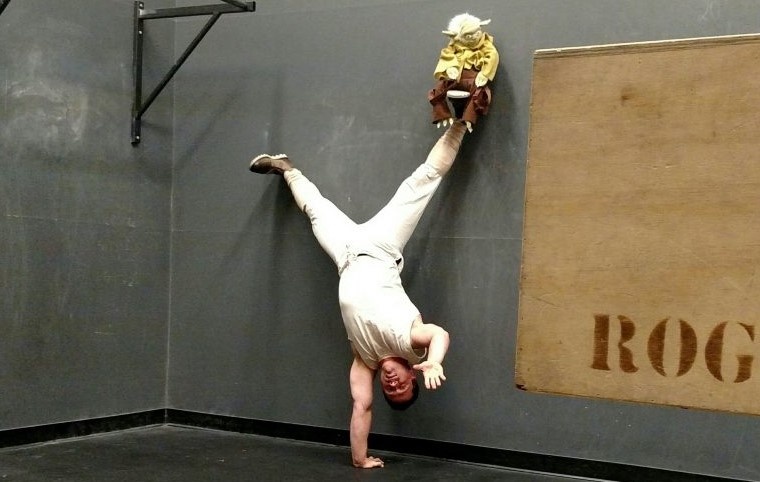
At Nerd Fitness we LOVE handstands like Eleven loves waffles.

Here are 3 reasons why handstands rule:
#1) Like other bodyweight training, there’s no excuse. If you have room to stand up, you have room to practice handstands.
#2) It recruits DOZENS of muscles in your body.
From arm strength to wrist mobility to core strength to shoulder mobility and muscular endurance, handstands do it all.

When you are trying to balance, it makes your body work as one complete unit.
#3) It scares you – yes, that’s a positive. We grow outside our comfort zone and for many people, just the thought of a handstand is enough to make their palms sweaty, knees weak, arms are heavy, vomi…

…nevermind.
The point is that the handstand is just as much of a mental challenge as it is a physical one.
How scared do you think this guy gets on a regular basis?

That’s Coach Jim!
Master of the NF Fitness Universe, and our lead trainer for our Handstands Course and Nerd Fitness Coaching. You’ll be seeing a lot of him in today’s article because Jim can do handstands in his sleep.[1]
The Secret to Performing a Handstand

Sure, we need to build strength to support ourselves upside-down, but even that hurdle is overblown.
A proper handstand actually starts to feel easy.
That’s because once you’re balanced and aligned, it becomes uber-efficient. Just as you don’t exert yourself much if you stand straight with good posture, a good efficient handstand is the same way… it will soon start to feel effortless.
Actually, the biggest hurdle to overcome – especially at the beginning – is the mental fear.

The voice/feeling in the back of your head that says “you could get hurt doing this!” SCARY!
And I won’t sugar-coat things, you CAN hurt yourself working on these skills… but it’s no different than if you walked into the gym first day, slapped 315 lbs on the bench press, and gave it a go.
Or went out and tried to run 13 miles without training.
The exercise itself isn’t dangerous, unless you attempt TOO much, too quickly.
If you wouldn’t load up a bar to deadlift 500 lbs on your first day in the gym, why do so many people just kick and fling themselves up into a handstand, failing repeatedly, hoping one day they’ll “get” it?
So…

There’s a smarter way!
How do we overcome this fear and keep ourselves safe? Just like learning any other fitness skill: slow, easy, successful steps!
These small victories accumulate over time to bring us to our goals safely while having a lot of fun.
Are you ready to learn?

Sweet, we’ve got you covered. Read on for ways to safely progress to handstand mastery!
Handstand Progression Warm-Up Routine
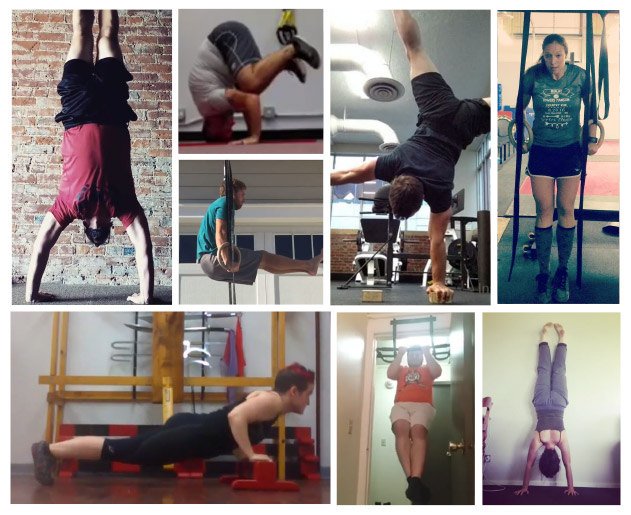
For any handstand exercise, there is going to be a significant amount of stress on the hands and wrists. So, it’s important you stretch and warm things up.
Here is a video from our NF Handstands course going over some of our favorite wrist stretches to prepare to get upside-down. Go through each stretch about 10 times.
Let’s spotlight a few of these Handstand Warm-Up exercises:
#1) Forward and Back Wrist Stretch:
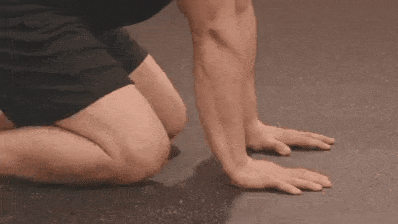
#2) Lifted Palms Wrist Stretch:
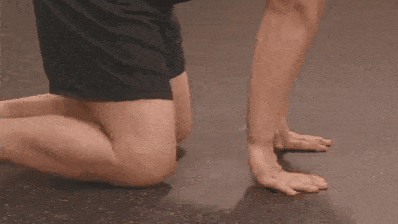
#3) Reverse Palm Stretch:
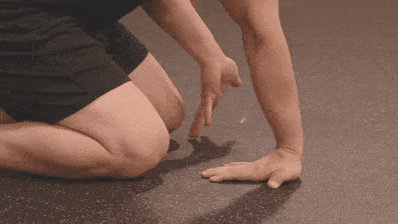
#4) Backhand Palm Stretch:
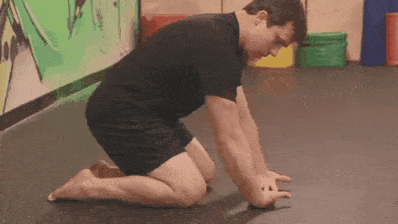
#5) Upside Down Wrist Stretch:
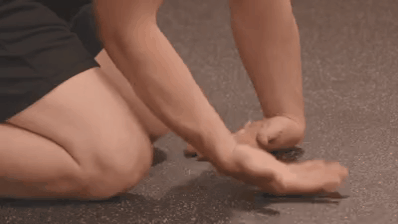
The trick with wrist stretches is to move in as many different ways as feels comfortable. Feel free to make the warm-up your own!
The shoulders are another stressed area in the handstand. There are several ways we can prepare them for work
A few rounds of jumping jacks:
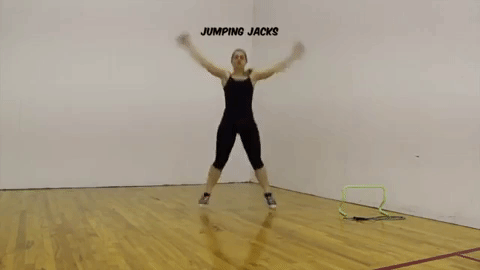
Or arm circles
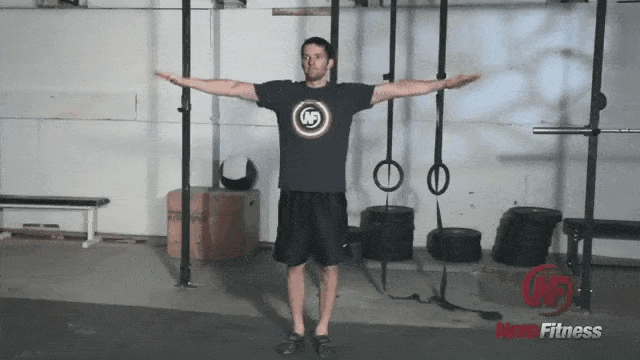
That will get the blood moving and the area ready.
From here, we’ll begin our journey leveling up your Handstand Progression.
We’ll start by having you work with some balance drills and some positional drills.
Nothing too crazy, and in fact some of these might seem TOO EASY. That’s fine! That’s what we want, remember?
We’re using small victories to motivate us. Landing on your head is not a great way to motivate anyone.
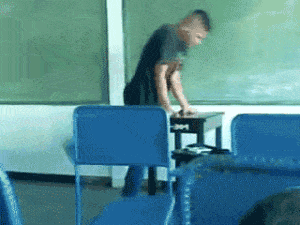
Ouch.
Want someone to build you a custom made progression plan for doing your handstand? Our 1-on-1 Online Coaching Program will do just that, plus your coach can review your movements through our app so you’ll know your training correctly and safely.
Level 1 Handstand Progression: Quadruped Rocking
You may be thinking that feeling the balance of a handstand is going to be brutally difficult.
Not so!
We can start quite easily on our hands and knees in the quadruped position.
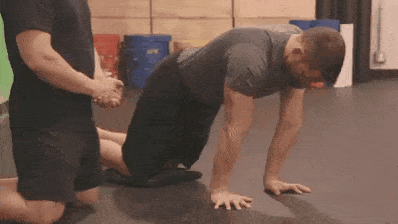
From here, we will simply rock forwards and backwards on our hands.
Seem familiar?
If you did the wrist mobility we described above, it’s the same motion!

Isn’t that handy?[2]
As you are rocking back and forth, feel where the weight rests in your hands.
- When you rock back, it sits more in the heel of your hands.
- When you rock forward, you’ll feel it in your knuckles and fingertips.
Where do we want it in the handstand?
Right around the knuckles.
This is a balanced spot – similar to the balance you find when standing. You don’t sit all your weight on your heels, and you don’t lean all your weight forward, gripping your toes hard into the ground, do you?
Find and feel that balance when you rock.
When should you move on to Level 2 Handstand Progression?
Now would work!
Level 2 Handstand Progression: Hollow Body
The hollow body is one of the best ways to engage the midsection and stabilize the body. It will help to give your handstand a good shape.
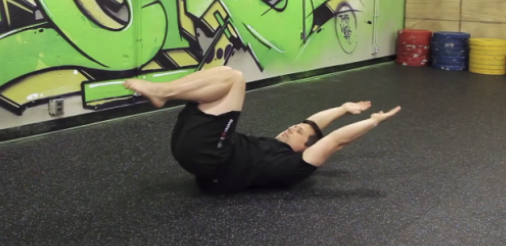
Do you need to master the hollow body to master the handstand?
Not necessarily, as there are plenty of handstands out there that are a bit banana-shaped.
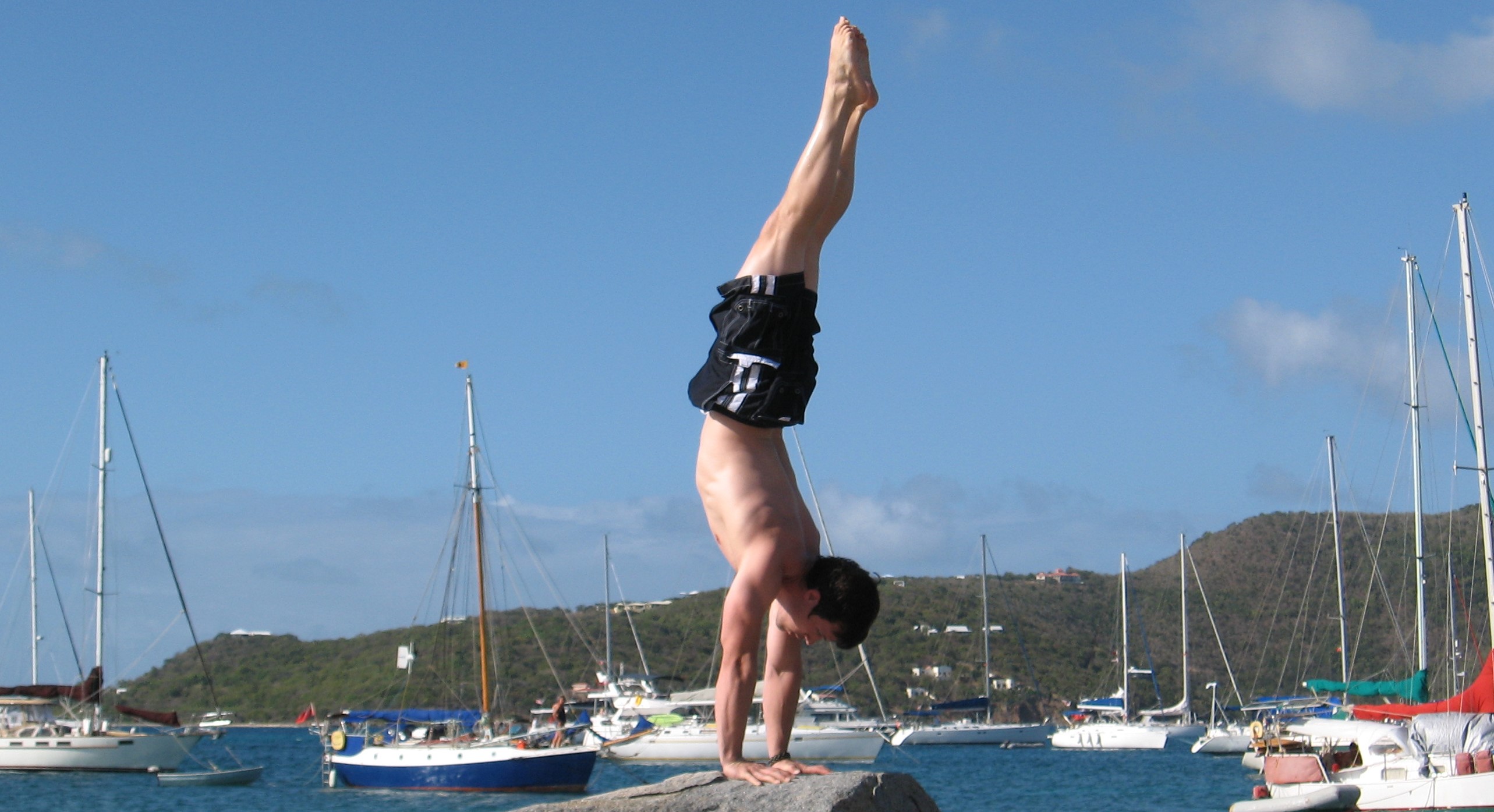
But the hollow body will help you create a more efficient position.
#1) Start by laying down a yoga or exercise mat on the ground and laying on the ground face up.
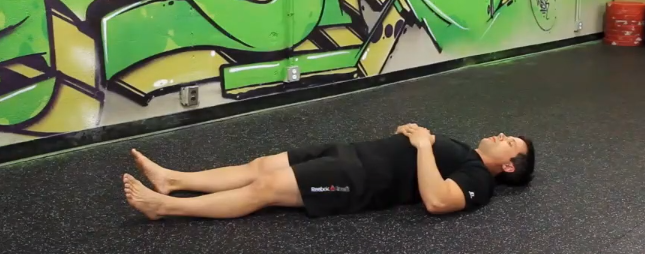
#2) Think about pressing your lower back down into the ground and engaging your midsection like you’re coughing. You should still be able to breath!
#3) Once the midsection is set, tuck your knees to your chest and hold your shins like you’re getting ready for a wicked cannonball.
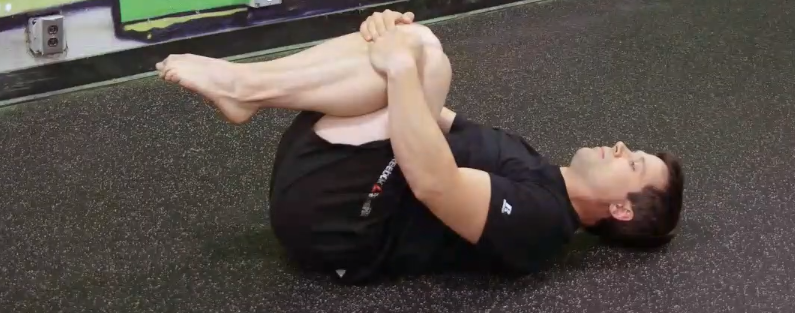
#4) Holding the shins will help you maintain that lower back and midsection position.
Still feeling good?
Then try rocking!
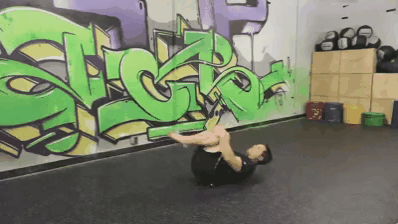
- Rock your body forward and back slightly from the upper back to the lower back, like a rocking chair.
- Head and feet stay off the ground.
- If you are stable then you should move as one unit.
If you need more of a challenge, reach your arms by your ears, keep the knees tucked, and rock some more.
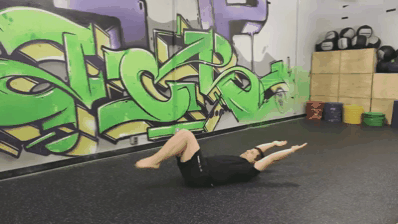
Without the hands holding the shins, the midsection really has to keep engaged in order to give you a smooth rock.
With any of these positions, work to rock for a full 15 seconds under control.
Once you can do so with arms extended, progress up to Level 3.
Level 3 Handstand Progression: Crow Pose
To enter Crow Pose, move forward from the Quadruped Rock position so that your knees are on the outside of your arms. You can even bend the elbows a little and rest your legs on them.
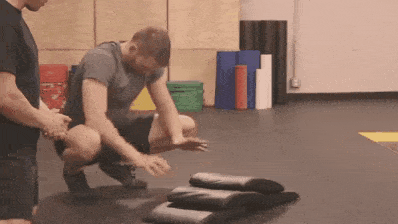
Rock forward in the same manner as before, putting a little more weight on the hands and a little less weight on the feet.
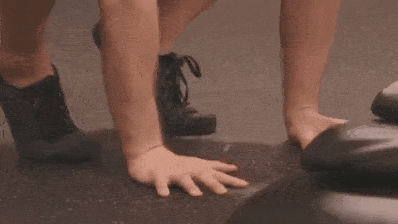
Important: this isn’t Assassin’s Creed… We are not making a leap of faith here!

Don’t jump!!!
We are simply looking for less and less weight on the feet.
Take things slow and easy – rising up on the toes when you can. When you are ready to pick the feet up and hold yourself off the ground on just your hands, it should come naturally.
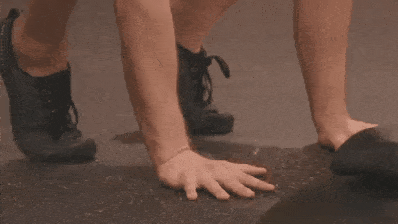
Be sure to grab into the ground hard to hold and control yourself, and feel free to put down a pile of pillows or mats in front of you if you should fall!
Once you’re able to get both feet off the ground comfortably and safely, it’s time for Level 4 Handstand Progression.
If you find yourself stuck at the crow position or any other level, we are here to help!
Our coaches can review your progression and form to help you advance onto the next level!
Level 4 Handstand Progression: Wall Walk
In this level, we’ll get started working toward something that actually looks like a handstand!

All we’re trying to do with this exercise is support our bodyweight on our straightened arms (just like the front plank or push-up).
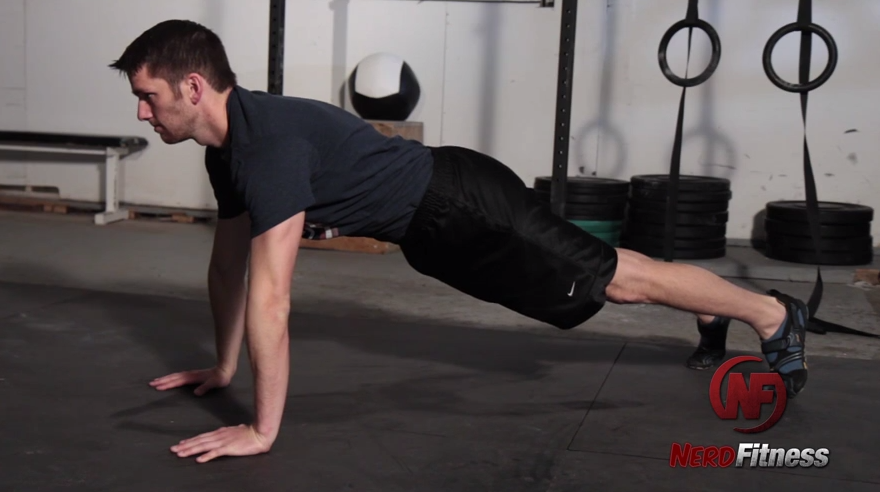
So, the first level of this exercise is to simply get yourself up into the top of a push-up and hold. If that’s too hard, put your hands up on an elevated surface and/or rest on your knees and hands instead.
Once this is mastered, level up by simply lifting your hips in the air into a down dog position!
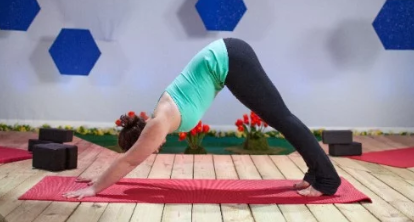
From here, it’ll be a matter of getting your feet onto a higher and higher surface.
Note: putting your feet up something even a few inches off the floor counts – small steps!
You can use something as simple as bumper plates:

As you progress, add more bumper plates (or whatever you’re using) so your feet are higher and higher.
Once you are supporting yourself with your feet on a high box, try walking your feet up the wall. (Think of it like a really tall box!)
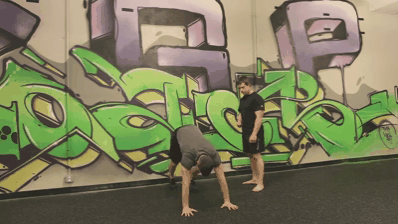
Be careful at this step: Be sure you have enough energy to walk back down safely and second, that you don’t walk too close to the wall and risk flipping onto your back!
See the next section on pirouettes to safely exit these wall walks if you happen to “go over!”
With each of these variations, we’re looking to build up to a solid 15 seconds under control before moving forward.
Once you’re at the point of lying vertically against the wall, you’re on your way to leveling up to a full handstand!
But first, we need to talk about how to bail safely.
Level 5 Handstand Progression: How to Bail out of a Handstand
As you start to get better with Wall Walks, and you practice getting closer and closer to completely vertical while upside down, there’s going to be instances where you start to “tip over.”
In order to safely return your feet to the ground, you’re going to want to do what we call a pirouette:

How to bail out of a handstand:
- Get into a wall handstand.
- Shift your weight to one arm (the planted arm), allowing the other arm to move.
- Drive one leg into the wall (the one that’s on the same side as the planted arm), and lean the opposite leg forward.
- Gravity pulls you around, and lets you lower your feet to the floor safely.
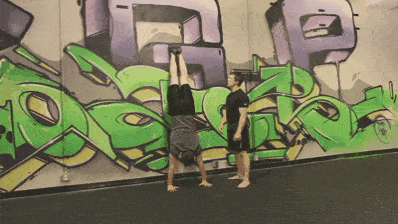
This is one of the most important skills you can learn as you develop your handstand practice, as it will allow you to safely exit any handstand without any risk of injury as you develop your balance!
Once you feel comfortable bailing out of a handstand, my dear rebel, it is time for Level 6!
Level 6 Handstand Progression: How to Do a Handstand
We are now ready for you to try a handstand!
It’s going to come down to you slowly but surely leaving the safety of the wall.
First, just try to take one leg off the wall during your wall walk:
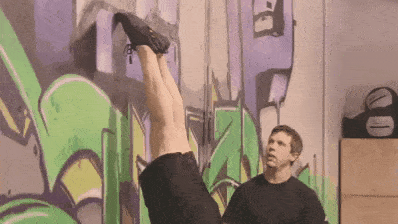
When you’re comfortable taking one leg off, trying switching them!
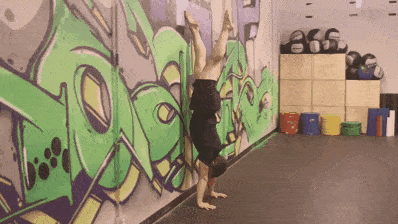
The objective is now is to switch your legs in a slow, smooth manner – one lifts off the wall while the other simultaneously moves back to the wall.
Once you get comfortable with this, it’s time to take both legs off the wall!
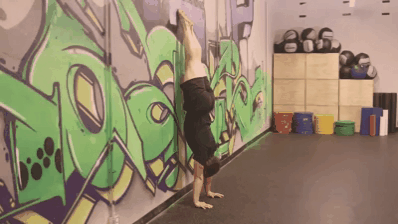
BOOM! Your first handstand!
Are you doing it right?
A good way to tell would be to record your handstand practice and review it against the videos here to check your form.
Want to have an expert review your form? Check out our 1-on-1 Online Coaching Program! Our spiffy mobile app lets you send a video of your handstand directly to your coach, who will provide feedback so you can perfect your technique.
They’ll also build a workout program that’s custom to your situation, which will have you doing handstands like Luke Skywalker in no time!
4 Tips and Tricks for Doing Handstands
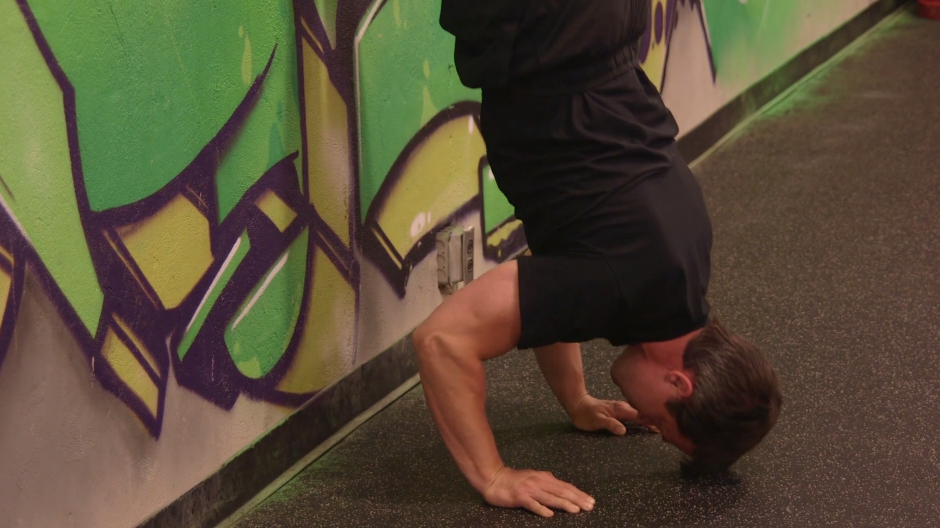
Nothing beats patience and hard work, but there are a few tips and tricks we can provide that will allow you the best chance for success.
#1) Make sure you go through a proper warm-up: We’ve given you several options for the wrists and shoulders. Not only will a warm-up help prevent injury, but it will get the muscles and joints properly prepared to get the most out of your training.
#2) Prioritize Your Handstand: You can work the skill on its own time, and it won’t interfere or be interfered by anything else, but what if you’re doing other exercises during your workout?
When do you do your handstand? When you’re training in a swamp?

The best time to work the balancing drills (like your wall walk) is at the beginning of your workout, after you’ve warmed up.
These skills require concentration and a fresh focus to really benefit and progress with them.
Trying to balance after you’ve exhausted yourself with a tough cardio session is an exercise in futility (pun intended).
The best time to work the positional drills (like your quadruped rock) would be sometime during your strength session, and before your cardio.
These drills are not as dependent on completely fresh muscles, but we still don’t want to try and hold ourselves upside-down after a grueling workout.
#3) Don’t do too much, too soon.
We’ve mentioned this a million times because it’s so important. Taking on too much too soon is a way to develop bad habits and possibly injure yourself.

Ouch again.
Take your time! Enjoy and really master each step!
#4) Take it Easy: In the same vein, we want to look for success.
What do I usually see when people practice handstands: Someone kicking up 100 times and kinda getting a handstand once or twice.
How much sense does that make?
While we might not be batting 1,000 with all our attempts, but we should be looking to successfully complete around 8 out of 10 attempts. If we’re not? Then we might have taken on too much, too soon!
Let’s wrap up this guide and give you some next steps for your handstand practice.
The 5-Minute Rule: Practice Handstands Every Day and Be Amazed at What Happens

Commit to 5 minutes a day. That’s it. But do it every day.
I’ll see a lot of people go all-in for a single handstand session, and then not touch the skill for a week or more.
Dan Gable once said”
“If it’s important, do it every day.”
Now, this is a simplification, but with handstands, this is ESPECIALLY important.
When you first start out, your arms and shoulder may only be able to do 5 minutes before they are DONE.
Doing them for a short time each day is the best strategy to improve strength, endurance, and balance.

Want help progressing with handstands from here? I’ve got 3 great options for you!
#1) If you want step-by-step guidance on how to complete handstands, get stronger, and even eat better, check out our killer 1-on-1 coaching program:
#2) Exercising at home and need a plan to follow? Have questions you need answered? Join Nerd Fitness Prime!
Nerd Fitness Prime contains at-home exercise routines, live-streamed workouts with NF Coaches, a supportive online community, and group challenges.
Plus, you’ll gain access to all our online courses, including Nerd Fitness: Handstands, which will help you become a master at flipping upside down!
#3) Join The Rebellion! We have a free email newsletter that we send out twice per week, full of tips and tricks to help you get strong, get healthy, and have fun doing so.
I’ll also send you tons of free guides that you can use to start leveling up your life too:
- The 15 mistakes you don’t want to make.
- Full guide to the most effective diet and why it works.
- Complete and track your first workout today, no gym required.
Alright, your turn:
Have you ever tried to kick up into a handstand?
What’s the one thing holding you back?
What questions can I answer?
-Steve
PS: One day I’ll be able to type articles like this while doing a handstand.
Jim, our lead trainer for Nerd Fitness Coaching, makes it look so easy:

###
Photo sources:[3]
The post How to Do a Handstand: Get Your First Handstand in 30 Days first appeared on Nerd Fitness.
from Nerd Fitness https://ift.tt/4cydMBJ
0 comments:
Post a Comment